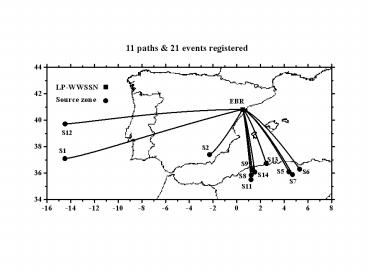Diapositiva 1
1 / 20
Title: Diapositiva 1
1
11 paths 21 events registered
2
11 paths 15 events registered
3
26 paths 45 events registered
4
Instrumental Response
The problem arisen in the recording of a physical
phenomena is well illustrated below. The
instrument used to perform this record distorts
the original true-signal x(t) given the output
signal y(t).
For this reason, a further process called
deconvolution must be performed to recover the
input signal x(t). Unfortunately, the input
signal x(t) is never recovered completely. Thus,
the signal recovered by the decondition filter is
not exactly equal to x(t). Nevertheless, if the
deconvolution process is well done, the recovered
signal can be used instead of the original signal
x(t), with a small error.
5
Convolution Formula
F(w) Ground spectrum ,, H(w) Instrumental
response
6
Instrumental Response
7
Instrumental correction (only amplitude
considered)
8
Instrumental correction (only phase considered)
9
Instrumental correction (amplitude and phase
considered)
10
Filtering process (MFT and TVF combined)
Preprocessed signal (observed seismogram with
instrumental correction)
MFT
Group velocity
TVF
Group velocity (final dispersion curve)
Filtered signal
MFT
11
MFT (Multiple Filter Technique)
Seismic event nº 34 (registered at EBR station)
(instrumental response corrected amplitude and
phase)
12
TVF (Time-Variable Filtering)
Observed signal (preprocessed)
TVF
Obtained by MFT
Filtered signal (time-variable filtered)
13
MFT application to the time-variable filtered
signal
(time-variable filtered)
14
Filtering process (comparison)
Wave train contamination is removed
Period range increased
15
Group velocity measurement for a path (average
group velocity and standard deviation)
Dispersion curves obtained after filtering
process (MFT and TVF combined) applied to 3
events registered at EBR station.
Average group velocity and standard deviation
(vertical bars) obtained from the group velocity
measurements showed above.
16
Forward Modeling (theoretical dispersion curve
from a starting model)
17
Inversion process for a path (shear velocity
structure from a dispersion curve)
S5-EBR
18
Paths with shear wave velocity structure
determined
19
References
Cara M. (1973). Filtering dispersed wavetrains.
Geophys. J. R. astr. Soc., 33,
65-80. Corchete V., Chourak M. and Hussein H.
M., 2007. Shear wave velocity structure
of the Sinai Peninsula from Rayleigh
wave analysis. Surveys in
Geophysics, 28, 299-324. Dziewonski A., Bloch S.
and Landisman M. (1969). A technique for the
analysis of transient seismic
signals. Bulletin of the Seismological
Society of America, 59, No. 1,
427-444.
20
CONTACT
Prof. Dr. Víctor Corchete Department of Applied
Physics Higher Polytechnic School - CITE
II(A) UNIVERSITY OF ALMERIA 04120-ALMERIA.
SPAIN FAX 34 950 015477 e-mail
corchete_at_ual.es































